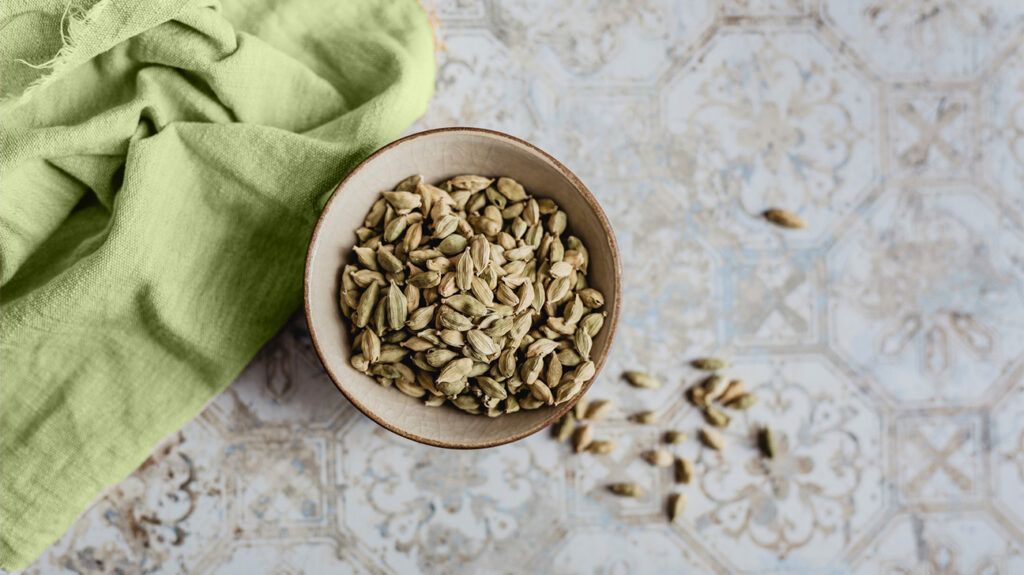People may use cardamom for its health benefits. It contains phytochemicals that have anti-inflammatory and antibacterial properties. Cardamom benefits may also boost heart health and oral health.
Cardamom is a spice that people have used for centuries in cooking and as a medicine. Initially a common ingredient in Middle Eastern and Arabic foods, it has also gained popularity in the West.
Cardamom comes from the seeds of several plants in the same family as ginger. Its distinctive flavor complements both sweet and savory dishes. Many use seeds and pods in curries, desserts, meat dishes, and beverages such as coffee and tea.
People may purchase cardamom as whole seed pods with the seeds inside, pre-ground cardamom spice powder, which manufacturers produce from seeds, as an essential oil, and as an herbal supplement, usually in the form of a capsule.
Researchers have conducted several small studies on cardamom, the findings of which suggest that it has some health benefits. Although these studies are promising, significant and controlled human studies are necessary before healthcare professionals can recommend cardamom to treat medical problems.

The oil from cardamom seeds may be able to kill bacteria.
One study found that cardamom fruit and seed extract effectively killed several different types of bacteria, particularly for periodontal infections such as gum disease. The researchers suggested that the cardamom’s antibacterial activity may be due to its ability to damage the cell membrane of certain bacteria.
Some studies suggest that cardamom could help with some aspects of metabolic syndrome.
Metabolic syndrome is a group of health conditions that can lead to heart disease and type 2 diabetes. It includes:
- abdominal obesity
- high blood sugar
- hypertension or high blood pressure
- high triglycerides
- low levels of “good” HDL cholesterol
In a 2021 review of studies discussed a clinical trial involving women with obesity and prediabetes who took 3 g (grams) of cardamom for two months, researchers found that total cholesterol and LDL, or “bad” cholesterol, were significantly reduced. Cardamom also protects HDL, or “good” cholesterol.
A 2023 meta-analysis of 8 studies found that cardamom significantly reduced multiple inflammatory markers (CRP, TNF, IL-6) and reduced blood pressure. Overall, the study participants who took cardamom had lower levels of C-reactive protein, inflammatory proteins, and other markers that can contribute to health problems.
Some research links cardamom with boosting heart health, though many more studies are necessary before researchers know how the spice affects human heart health.
In a 2024 study with findings similar to the above, researchers found that the bioactive compounds in cardamom could aid cardiovascular health by improving inflammation and blood lipids, such as cholesterol and triglycerides.
While many people may think of mint and cinnamon as breath fresheners, people have used cardamom for this purpose for centuries.
Cardamom may help fight bacteria in the mouth, a common cause of bad breath, cavities, and gum disease.
A 2020 study found that the anti-inflammatory and antioxidant properties of cardamom seeds and fruit could help improve oral health. The findings showed that the cardamom extract effectively disrupted bacteria that can lead to gum disease or infections.
In Ayurvedic medicine, people use cardamom for its detoxifying properties. Although there is a lack of scientific evidence to confirm this benefit, cardamom does appear to have some helpful effects on the liver, which plays a crucial role in removing toxins from the body.
One
Another study found that cardamom can help alleviate oxidative stress resulting from acetaminophen poisoning, which is a common pain reliever.
Cardamom contains natural phytochemicals that may fight diseases such as cancer. It cannot replace cancer treatment, but some studies suggest that the spice could have cancer-fighting properties.
A 2024 study found that the phytochemicals in cardamom may help when the body becomes resistant to cancer-fighting treatments such as chemotherapy and protect against toxicity resulting from chemotherapy.
Like ginger, cardamom, its cousin, could help with digestive ailments. Some people use the spice to make a stomach-soothing tea. It may also help protect the stomach from ulcers.
A 2024 study found that cardamom essential oil may protect against ethanol-induced stomach ulcers in rats by reducing oxidative damage. However, further studies are necessary on the gastro-protective effects of cardamom in humans.
Cardamom contains several vitamins and minerals, as well as some fiber. It is also very low in carbohydrates and calories.
According to the
- calories: 18
- total fat: 0.4 grams (g)
- carbohydrates: 4.0 g
- fiber: 1.6 g
- protein: 0.6 g
It also contains the following quantities of vitamins and minerals:
- potassium: 64.9 milligrams (mg)
- calcium: 22.2 mg
- iron: 0.81 mg
- magnesium: 13.3 mg
- phosphorus: 10.3 mg
Cardamom is safe for most people as a spice and flavor agent. There are no reported risks or adverse side effects from using it in cooking.
There is no established dosage for taking cardamom as a supplement. Many cardamom capsules or tablets list a dosage of 400–500 mg of dried herb per pill. Before taking cardamom pills or any other natural supplements, a person should talk with a healthcare professional.
What does cardamom taste like?
Cardamom has a strong, warm flavor that is both spicy and sweet. Some people say that it has a mint or lemon taste.
What is cardamom good for?
People can use cardamom in curries, meat dishes, desserts, coffee, and chai tea. Consuming cardamom may help with conditions such as metabolic syndrome and diabetes and boost oral, heart, and liver health. It may also offer antimicrobial properties, help prevent ulcers, and fight cancer.
Does cardamom taste like cinnamon?
Cardamom and cinnamon are both warm and spicy. Some people say cinnamon also has a slightly citrus flavor, but the flavors are different.
Although many health benefits need further study, cardamom is safe for most people to take in moderate amounts.
Cardamom’s natural phytochemicals have antioxidant and anti-inflammatory abilities that could improve health. However, it is too early to say whether this spice can treat health conditions.
SHOP FOR CARDAMOM
Cardamom is available in a range of forms, and the best type to purchase depends on a person’s preferred method of use. People can find cardamom in some drugstores and supermarkets or purchase it online:


